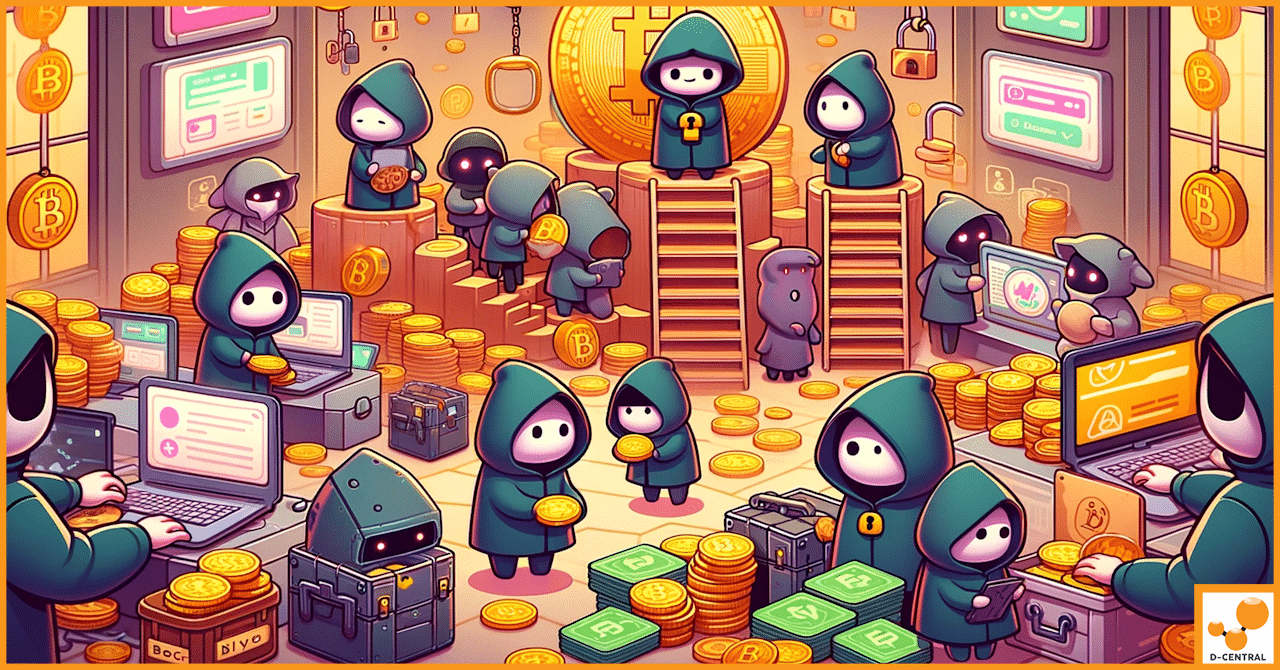
The Beginner’s Guide to Non-KYC Bitcoin: Acquire, Use, and Secure Your Cryptocurrency Privately
In the ever-evolving landscape of digital finance, Bitcoin has emerged as a revolutionary force, challenging traditional banking systems and offering
4479 Desserte Nord Autoroute 440, Laval, QC H7P 6E2

In 2008, the world was introduced to a revolutionary concept that would challenge the very fabric of the global financial system. This was the year Bitcoin, the first cryptocurrency, was conceived by an individual or group of individuals under the pseudonym Satoshi Nakamoto. Born out of the chaos of the financial crisis, Bitcoin presented a radical new idea: a decentralized digital currency, secure from manipulation and independent of traditional banking institutions. The publication of the Bitcoin whitepaper, “Bitcoin: A Peer-to-Peer Electronic Cash System,” laid the groundwork for what would become a monumental shift in how money could be understood, used, and valued.
Bitcoin’s journey from an obscure digital novelty to a globally recognized financial asset is nothing short of remarkable. Initially valued at a fraction of a cent, Bitcoin has weathered volatile market swings, regulatory scrutiny, and significant public skepticism to achieve record valuations, drawing the attention of investors, corporations, and governments worldwide. Its underlying technology, blockchain, has spurred a wave of innovation across industries, far beyond its initial financial applications.
The story of Bitcoin is not merely one of rapid price appreciation but a testament to the enduring appeal of a system that offers greater transparency, security, and freedom from central authority. In this article, we aim to explore the reasons behind Bitcoin’s persistent relevance and growing influence in the financial landscape. We will examine its foundational principles, such as decentralization, limited supply, and censorship resistance, alongside the Lindy Effect, which suggests that Bitcoin’s continued existence could imply its future persistence. Through this exploration, we seek to understand not just the phenomenon of Bitcoin’s rise but also its potential to reshape the future of finance in a world increasingly disillusioned with traditional monetary systems.
Decentralization: Empowering Financial Sovereignty
At the core of Bitcoin’s innovative appeal is its decentralized nature, a characteristic that fundamentally disrupts the traditional banking system. Unlike conventional currencies, which are regulated by central banks and financial institutions, Bitcoin operates on a peer-to-peer network. This structure ensures that no single entity has control over the currency, making Bitcoin resistant to censorship and immune to the whims of any government or financial body. This decentralization not only challenges the central authority’s monopoly over money but also empowers users with unprecedented financial sovereignty. Participants in the Bitcoin network can transact directly with one another without the need for intermediaries, reducing transaction costs and enhancing financial inclusivity. This radical shift towards a more democratic financial system has paved the way for a new era of economic freedom, where individuals have full control over their assets.
Blockchain Technology: The Backbone of Digital Trust
Blockchain technology, the backbone of Bitcoin, is what enables this decentralization to function effectively. At its simplest, the blockchain is a distributed ledger that records all transactions across a network of computers. This technology ensures that each transaction is secure, transparent, and immutable. Once a transaction is recorded on the blockchain, it cannot be altered or deleted, creating a permanent and public record of all transactions. This immutability guards against fraud and unauthorized manipulation, fostering a high level of trust among users. Furthermore, the transparent nature of the blockchain means that anyone can verify the transactions, ensuring a level of openness that traditional financial systems cannot match. Blockchain’s innovative approach to secure, transparent, and immutable record-keeping is what underpins Bitcoin’s reliability and appeal as a digital currency.
Limited Supply and Its Economic Implications
One of the most distinctive features of Bitcoin is its limited supply. The total number of bitcoins that can ever exist is capped at 21 million. This scarcity is by design, a stark contrast to fiat currencies, which can be printed in unlimited quantities by central banks, often leading to inflation. Bitcoin’s capped supply introduces a deflationary aspect to its economy. As demand for Bitcoin increases, the limited supply ensures that its value is likely to continue appreciating over time. This scarcity mimics the properties of gold, earning Bitcoin the moniker “digital gold.” The deflationary nature of Bitcoin is viewed as a hedge against inflation, attracting investors who see it as a store of value in uncertain economic times. Furthermore, the predictable rate at which new bitcoins are created (through a process called mining) and the halving events (which reduce the reward for mining new blocks) ensure that the supply of Bitcoin increases at a decreasing rate. This scarcity principle not only preserves the purchasing power of Bitcoin over time but also contributes to its long-term viability as an investment and a revolutionary financial instrument.
Regulatory Navigation: Adapting to a Diverse Global Landscape
Bitcoin’s journey has been marked by a complex regulatory landscape that varies significantly across different countries. From outright bans to enthusiastic endorsements, the regulatory response to Bitcoin has been anything but uniform. Despite these challenges, Bitcoin continues to thrive, showcasing its inherent resilience and adaptability. This persistence is largely due to its decentralized nature, which makes it difficult for any single government or regulatory body to control or suppress the network entirely. Additionally, the cryptocurrency community has been proactive in engaging with policymakers, advocating for favorable regulations that foster innovation while ensuring user protection. As Bitcoin becomes more integrated into the financial system, a growing number of countries are recognizing the need to develop clear regulatory frameworks that can accommodate this new asset class, further legitimizing its presence in the global market.
Price Volatility: Navigating the Rollercoaster
Bitcoin is well-known for its price volatility, with values that can swing dramatically over short periods. This volatility is attributed to several factors, including market speculation, varying levels of liquidity, and reactions to regulatory news and developments within the cryptocurrency space. While such volatility can pose challenges for investors, it also offers opportunities for significant gains. Many investors and traders have adapted their strategies to accommodate Bitcoin’s price fluctuations, employing tactics such as dollar-cost averaging or strategic diversification to mitigate risk. Furthermore, as Bitcoin matures and gains wider acceptance, its market is becoming more liquid and less susceptible to sharp swings caused by individual trades. The growing involvement of institutional investors and the development of financial products based on Bitcoin also contribute to stabilizing its price over time.
Enhancing Security: Fortifying the Fortress
Security concerns have been a constant companion on Bitcoin’s path to mainstream acceptance. From high-profile exchange hacks to wallet vulnerabilities, these challenges have highlighted the importance of robust security measures. In response, the Bitcoin community and industry stakeholders have made significant strides in enhancing the security of both the network and user funds. Innovations such as hardware wallets and multi-signature transactions offer users more control over their digital assets, reducing the risk of theft. On the network level, continuous updates to Bitcoin’s protocol and the inherent security of blockchain technology help safeguard against attacks. Education also plays a crucial role in enhancing security; as users become more knowledgeable about best practices for securing their assets, the ecosystem as a whole becomes more resilient. The ongoing efforts to improve security are a testament to the community’s commitment to making Bitcoin a safe and reliable form of digital currency.
Censorship Resistance: Navigating the Freedom of Transaction
A pivotal element of Bitcoin’s appeal lies in its ability to resist censorship and control by any external entity, ensuring that users’ transactions remain unfettered regardless of geopolitical boundaries or political climates. This feature is deeply ingrained in Bitcoin’s decentralized architecture, where transactions are processed on a global network of nodes rather than through a centralized authority. Consequently, Bitcoin empowers individuals in oppressive regimes or those facing financial censorship with the ability to freely transact. This resistance to censorship is not merely theoretical; it has practical implications for millions worldwide, offering a financial lifeline where traditional systems have failed or are inaccessible.
The Lindy Effect: The Proven Durability of Bitcoin
The Lindy Effect posits that the future life expectancy of a non-perishable entity (like a technology or idea) is proportional to its current age, meaning that the longer something has been around, the longer it’s likely to persist. Applying this concept to Bitcoin suggests that with each passing year, Bitcoin’s endurance is not only demonstrated but also its expected lifespan extends. This effect contributes to growing trust and stability in Bitcoin as it continues to survive challenges and fluctuations. The Lindy Effect underscores Bitcoin’s resilience, reinforcing its position as a reliable store of value and medium of exchange in the digital age.
Global Adoption: The Path to Mainstream Acceptance
Bitcoin’s journey toward global adoption is marked by a steady increase in acceptance and recognition across various sectors. From small businesses to multinational corporations, and even certain governments, the spectrum of Bitcoin’s acceptance is broadening. Countries like El Salvador have taken monumental steps by adopting Bitcoin as legal tender, setting a precedent for others to follow. This widespread adoption is facilitated by the growing infrastructure supporting Bitcoin transactions, including payment processors, ATM networks, and digital wallets, making it more accessible and practical for everyday use. Global adoption not only validates Bitcoin’s utility but also amplifies its network effect, enhancing its value and resilience.
Technological Progress: Scaling Bitcoin for the Future
The ongoing technological evolution within the Bitcoin ecosystem plays a critical role in addressing some of the initial limitations of the network, particularly concerning scalability and user experience. Innovations such as the Lightning Network—an off-chain, second-layer protocol—offer a promising solution to Bitcoin’s scalability challenges, enabling instant, high-volume transactions at a fraction of the cost. Such advancements are crucial for Bitcoin’s long-term viability as a medium of exchange, alongside its established role as a store of value. Additionally, continuous improvements in security, privacy, and user interface design across the ecosystem make Bitcoin more accessible and appealing to a broader audience, fueling its growth and endurance.
Each of these factors—censorship resistance, the Lindy Effect, global adoption, and technological progress—interconnects to fortify Bitcoin’s foundation. Together, they weave a narrative of endurance, resilience, and innovation that underpins Bitcoin’s continued relevance and potential to reshape the financial landscape of the future.
Entering the world of Bitcoin can seem daunting at first, but engaging with this revolutionary digital currency is simpler than it might appear. The first step is acquiring Bitcoin, which can be done through various platforms including cryptocurrency exchanges, Bitcoin ATMs, and peer-to-peer transactions. Each method offers its own advantages in terms of convenience, privacy, and fees. Once acquired, using Bitcoin for transactions is straightforward, thanks to a growing number of merchants and online platforms accepting Bitcoin payments.
Secure storage is paramount when dealing with Bitcoin. Wallets come in various forms—hardware, software, and paper—each providing different levels of security and accessibility. Hardware wallets, considered the most secure, store Bitcoin offline, making them immune to online hacking attempts. Understanding the trade-offs between wallet types is essential for safe Bitcoin storage and management.
The World of Bitcoin Mining: Contributing to the Network
Bitcoin mining is the process by which new bitcoins are introduced into circulation and transactions are confirmed and added to the blockchain ledger. Mining involves solving complex cryptographic puzzles, a task that requires considerable computational power. Miners are rewarded with new bitcoins and transaction fees, incentivizing their participation in the network.
Entities like D-Central Technologies play a crucial role in supporting the Bitcoin mining ecosystem. They provide mining hardware, hosting solutions, and expert advice, making mining more accessible to individuals and enterprises alike. By contributing to mining, participants not only have the potential to earn Bitcoin but also contribute to the security and robustness of the entire network.
Engaging with Bitcoin, whether through investing, mining, or learning, offers an opportunity to be part of a financial revolution. As the ecosystem continues to evolve, staying informed and cautious will be key to navigating the world of Bitcoin successfully.
Bitcoin, since its inception in 2008, has traversed an extraordinary journey, evolving from a cryptographic experiment into a global financial phenomenon. Its enduring appeal lies in the core principles of decentralization, security, and innovation, which have enabled it to resist censorship, navigate regulatory challenges, and withstand market volatility. Despite the speculation and scrutiny it has faced, Bitcoin’s resilience is a testament to its foundational technology and the robust community that supports it. The cryptocurrency continues to captivate the imagination of individuals and institutions alike, drawing attention to its potential not just as an investment asset but as a transformative force in the financial world.
The journey of Bitcoin is far from over. Its ongoing development, increasing global adoption, and the continuous exploration of its technological capabilities suggest that Bitcoin’s impact on finance and beyond is still unfolding. Whether you are drawn to Bitcoin for its potential to hedge against economic uncertainty, its promise of financial autonomy, or its technological innovation, engaging with this digital currency opens up a world of possibilities.
We encourage readers to dive deeper into the world of Bitcoin, whether through investment, participating in mining, or simply committing to continuous learning about this dynamic field. Entities like D-Central Technologies provide valuable resources and support for those interested in Bitcoin mining, demonstrating the collaborative spirit that drives the Bitcoin ecosystem forward. By exploring Bitcoin’s potential, you become part of a community that is shaping the future of finance, embracing a system that values transparency, equity, and empowerment.
As Bitcoin continues to mature and evolve, the opportunity to be part of this financial revolution has never been more accessible. Dive into the resources available, join the conversation, and contribute to the decentralized future that Bitcoin envisions. The path of Bitcoin is being written by those who dare to explore its potential—join the journey and discover where it might lead you.
What is Bitcoin?
Bitcoin is the first cryptocurrency, introduced in 2008, that operates on a decentralized network enabling secure, transparent, and peer-to-peer transactions without the need for central authorities or intermediaries.
What makes Bitcoin revolutionary?
Bitcoin is revolutionary due to its foundational principles of decentralization, security, limited supply, and consensus. These principles enable transparency, financial sovereignty, and resistance against censorship, challenging traditional financial systems.
What is blockchain technology?
Blockchain technology is the underlying infrastructure of Bitcoin, serving as a distributed ledger that records all transactions across a network of computers. It ensures transactions are secure, transparent, and immutable.
Why does Bitcoin have a limited supply?
Bitcoin has a capped supply of 21 million coins, designed to prevent inflation, maintain scarcity, and preserve value over time, mirroring properties of commodities like gold and contributing to its nickname “digital gold.”
How does Bitcoin navigate regulatory challenges?
Despite a diverse global regulatory landscape, Bitcoin’s decentralized nature makes it resilient and adaptable. The cryptocurrency community actively engages with policymakers to advocate for favorable regulations.
What is Bitcoin mining?
Bitcoin mining is the process where new bitcoins are introduced and transactions are confirmed in the network. Miners solve cryptographic puzzles, contributing to the network’s security and receiving bitcoins and transaction fees as rewards.
How can individuals engage with Bitcoin?
Individuals can engage with Bitcoin by purchasing it through exchanges, ATMs, or peer-to-peer platforms, using it for transactions, storing it in secure wallets, or participating in mining to contribute to the network’s security.
What role does D-Central Technologies play in Bitcoin mining?
D-Central Technologies supports the Bitcoin mining ecosystem by providing hardware, hosting solutions, and expert advice, making mining more accessible to individuals and enterprises and enhancing the network’s robustness.
DISCLAIMER: D-Central Technologies and its associated content, including this blog, do not serve as financial advisors or official investment advisors. The insights and opinions shared here or by any guests featured in our content are provided purely for informational and educational purposes. Such communications should not be interpreted as financial, investment, legal, tax, or any form of specific advice. We are committed to advancing the knowledge and understanding of Bitcoin and its potential impact on society. However, we urge our community to proceed with caution and informed judgment in all related endeavors.
Related Posts

In the ever-evolving landscape of digital finance, Bitcoin has emerged as a revolutionary force, challenging traditional banking systems and offering

The realm of cryptocurrency mining has evolved dramatically since the inception of Bitcoin in 2009. Initially a niche hobby for

D-Central Technologies is thrilled to announce the pre-sale of the Bitaxe Hex, the latest innovation in our renowned Bitaxe series